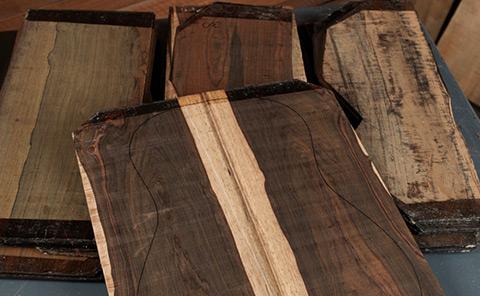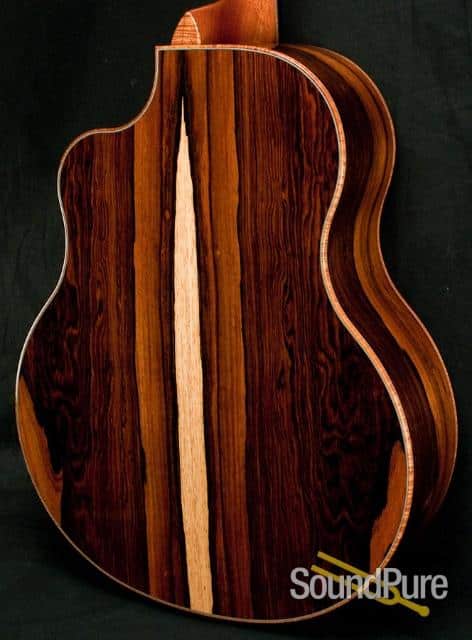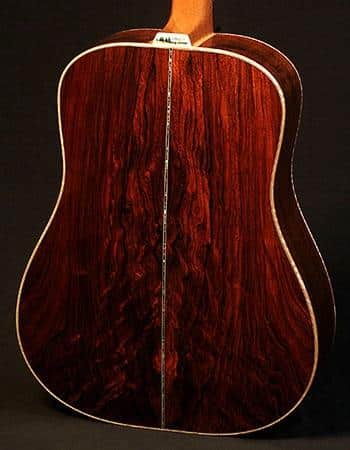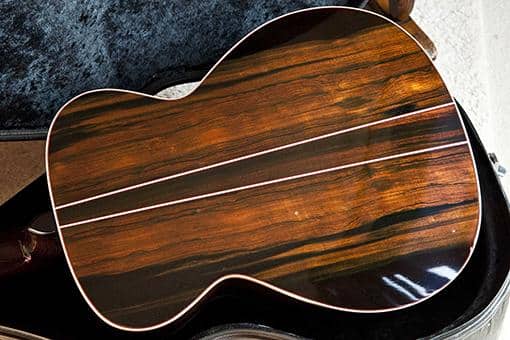Have you ever experienced the unmistakable resonance that echoes from the hollows of a Brazilian rosewood guitar? My introduction to this exceptional instrument occurred in 1994, a seismic shift that reframed my outlook as an engineer turned lutherie enthusiast.
Engaging the strings of this exquisite acoustic masterpiece, I was captivated. But what transpired next? We’ll dive into my journey in the paragraphs to follow.
Impressive isn’t it, that among the world’s array of tonewoods, it’s the Brazilian rosewood guitar that is most revered? Yet, the full extent of why is often overlooked. You’ll be intrigued to discover the in-depth analysis, that’ll soon unravel.
Here’s a statement to stir thought: the Brazilian rosewood guitar isn’t only a mere musical instrument; it’s an unmatched symphony rooted in nature itself. Is this claim too audacious, or can I genuinely back it? Stick around, let’s find out together.
As we delve into the aesthetics, sound quality, legality, and value of the Brazilian rosewood guitar, I promise a compelling exploration. Prepare to be entranced, as we strum our way through the intricate world of these remarkable acoustic guitars.
The Significance of Brazilian Rosewood Guitars
Brazilian Rosewood vs. Other Tonewoods

In the realm of tonewoods, the use of Brazilian rosewood is worth noting for its significant contribution to acoustic dynamics, particularly in comparison to other varieties like Indian rosewood. As an engineer and lutherie expert, I’ve encountered various tonewoods; however, Brazilian rosewood stands out with its exceptional acoustic properties.
Brazilian rosewood vs. Indian rosewood is an ongoing debate in the guitar world. Both boast unique guitar tone wood qualities, but the former offers superior resonance, warmth, and richness. Brazilian rosewood is denser, contributing to a robust, complex tone, filled with overtones. In contrast, Indian rosewood, although it provides warm, smooth tones, doesn’t quite match up in terms of depth and complexity.
As compared to other tonewoods, it’s the distinct sound quality and visual appeal that sets Brazilian rosewood apart. Mahogany, for example, is widely praised for its responsiveness and bright tonality, but lacks the crystalline clarity and deep bass properties of Brazilian rosewood. Lastly, contrary to dark-toned woods like walnut, Brazilian rosewood offers a wider tonal range.
Learning about the characteristics of different tonewoods isn’t just for luthiers—it’s fundamental for any guitarist to understand the correlation between wood type and sound quality. While preference might differ from player to player, the tonal superiority of Brazilian rosewood is undebatable from my extensive experience. The high demand and correspondingly higher value of this wood reflect its prestige in the guitar industry. More on Brazilian rosewood’s value in the coming sections, but for now, let’s delve deeper into the sound and tone quality of rosewood guitars.
Rosewood Guitar Sound and Tone Quality

Moving forward in our exploration of the unique characteristics of Brazilian Rosewood guitars, it is vital to focus on the distinct qualities that allow these instruments to have a remarkably unique Rosewood guitar sound. This idiosyncratic aspect of the rosewood guitar sound can never be overstated. The power, richness, and depth of these legendary tonewoods make them truly unrivaled in the world of fine guitar crafting.
Yet, the beauty and allure of rosewood guitars stretches beyond mere aesthetics. As a passionate guitarist with years of experience playing and studying these remarkable instruments, I can vouch for the immeasurable contribution that the unique tonal qualities of rosewood offer to you as a player. Every strum, every chord yields a rich, warm and resonant sound, enveloping the air in an enchanting auditory embrace.
These tonal characteristics aren’t mere accidents. They can be attributed to the unique structural properties of this rare wood, which possesses a naturally high oil content and a dense grain. These contribute to its rich overtones, comprehensive frequency range, and exquisite sustain; each attribute is simply a testament to its preeminence among legendary tonewoods in the art of guitar making.
In conclusion, the essence of the Brazilian Rosewood’s guitar sound lies in its stunning character, a combination of resonating depth, warmth, and clarity of tone that defines quality. The romance of these exemplary instruments lies in their unique tone, a sound so enchanting and dynamic, it is genuinely irreplaceable. Moving forward in our discourse, we will delve into the legal perspectives and travelling aspects associated with owning and transporting Brazilian Rosewood guitars; practical considerations to appreciate alongside the siren call of their enchanting tone.
Legal Perspectives and Traveling Aspects

Then comes the often-overlooked aspect of owning a Brazilian Rosewood guitar: the legal implications. As an active member of the New England Luthiers group, this all-important issue regularly comes into conversations with fellow luthiers. And let me tell you, the nuances run deeper than one can imagine. Importantly, this is where my personal experiences of traveling with rosewood guitars come into play.
Have you considered the legal implications of owning a Brazilian Rosewood guitar? If not, listen up. Sourcing, possessing and even traveling with Brazilian Rosewood products is steeped in complexity due to international regulations. A significant reason for this is the CITES restrictions on rosewood designed to protect Dalbergia nigra, or Brazilian Rosewood, a species now listed as vulnerable.
Imagine you decide to travel to your dream destination with your prized Brazilian Rosewood guitar. Now, as customary for us musicians, the guitar is more than an instrument; it’s an extension of our soul. The prospect of parting with it, even temporarily, raises goosebumps. However, without understanding the complexities of Brazilian rosewood regulations, you might end up with an unexpected and unpleasant surprise at customs. I’ve been there, and it’s an experience that can shake even the most stoic of us.
Therefore, recognizing and appreciating these regulations is vital. In my travels across the globe, I’ve seen varying degrees of enforcement, but one thing remains constant – knowledge is indeed power. Acquiring an understanding of the CITES restrictions and getting necessary permissions have made my experiences of traveling with rosewood guitars less nerve-wracking and more predictable.
The takeaway here is this: if you own or plan to own a Brazilian Rosewood guitar, prepare to step into a world of legal strings and potential restrictions. Especially if, like me, your guitar is your faithful travel companion. By understanding the legal implications upfront, you can navigate the complexities with less stress and more grace.
With this focus on legality, we’ll transition next to ponder another key aspect of Brazilian Rosewood guitars: their inherent value. But let me assure you, the immense joy of creating music on a Brazilian Rosewood guitar and experiencing its incredible tonal palette more than compensates for any legal hoops there might be. Stick around as we uncover what makes them truly worth the investment in our next section.
The Value of Brazilian Rosewood Guitars

Having dissected the historical and musical relevance of Brazilian Rosewood guitars, I now turn our attention towards their pecuniary value. My experience as an editorial consultant for several books on stringed instruments continues to play an instrumental role in understanding this aspect. So, let’s dive into the world of Brazilian rosewood guitar value and what makes these beauties worth every penny.
Why do Brazilian Rosewood guitars command such high values? It’s a question, dear readers, that stems from an intricate blend of factors. From the outset, this storied wood, regarded as the Holy Grail of tonewoods, has been in high demand due to its innate musical expressiveness. However, the scarcity of Brazilian Rosewood, on account of environmental laws protecting this endangered species, has only amplified its value significantly.
The first factor is the unique sound quality these guitars offer. Brazilian Rosewood guitars create an unrivaled blend of deep bass, sparkling highs, and an alluring midrange that has musicians and collectors alike yearning for them. Their unmatched tonal characteristics contribute immensely to their value.
Further, Brazilian Rosewood boasts stunning visual aesthetics. The wood grain varies from straight to beautifully figured, presenting an array of colors from chocolate brown to purplish-black with dark streaks. This natural artistry coupled with the skilled craftsmanship of guitar makers only enhances the guitar’s monetary value.
The value of Brazilian Rosewood guitars also lies in their historical import. By owning one, you’re a party to an aristocracy of music, a connoisseur with a rare piece of art that hails back to the golden era of luthiery.
Lastly, it’s also an investment. Values of vintage Brazilian Rosewood guitars have soared over the years, driven by the increasing demand in the collectors’ market. An investment into a Brazilian Rosewood guitar is a tangible asset, an embodiment of beauty, rarity, and musical brilliance that appreciates over time.
Do not let the high values deter you. Instead, see it as an emblem of artistry, craftsmanship, historical significance and, most importantly, an unparalleled musical experience. As we move on to discuss where to source these precious instruments, know that the value of Brazilian Rosewood guitars isn’t only in their price tag—the heart of their worth rests in your hands, as you create the music they were meant to render.
Where to Purchase Brazilian Rosewood Guitars

In my journey of aiding guitar enthusiasts around the globe, I’ve guided countless seekers towards the right instrument for their unique tastes and goals. Time and again, this path has led us to the beautiful resonance and visual elegance of the Brazilian rosewood guitar. However, given their rarity and value, sourcing these prized instruments requires insight into the most reliable markets.
Interested in owning a Brazilian Rosewood guitar but unsure where to start? Through my lutherie community website, Liutaio David Garcia Lutherie Information, I can help you navigate the intricacies of finding the perfect guitar.
The first place I often direct individuals to is boutique, high-end guitar stores. The reputation they have in selling top quality instruments, including Brazilian rosewood guitars, speaks volumes about their authenticity. These stores usually have contacts with renowned luthiers, ensuring that the instruments you get are nothing short of high quality. If you’re local or visiting these regions, it’s the perfect chance to personally inspect these guitars before making an investment.
For those who cannot access these stores, online platforms provide an accessible alternative. Websites like Reverb and Guitar Center have a range of Brazilian rosewood guitars available. Don’t forget to meticulously scrutinise the seller’s ratings and feedback. It is also recommended to request detailed photographs and any available certificates of authenticity.
Finally, auctions are another avenue to consider. Although they can be somewhat unpredictable, they offer a chance to acquire some truly unique pieces including vintage models.
Remember, with Brazilian rosewood guitars, quality supersedes all. Don’t rush for deals that seem too good to be true without rigorous verification. Make sure you’re dealing with reputable sellers who understand the value and can accurately describe the instrument you’re purchasing. Rest assured, the quest for your ideal Brazilian rosewood guitar may require diligence, but the reward of owning such an instrument is beyond comparison.
FAQs
What is a Brazilian Rosewood Guitar?
Why is Brazilian Rosewood preferred for guitars?
Are Brazilian Rosewood Guitars rare?
Conclusion
Ready to embark on your journey to understanding and appreciating the charm of Brazilian Rosewood guitars? If the answers to the 5Ws are still a swirl of confusion; worry not. The core essence of this guide has been about the exploration, appreciation, and context of Brazilian Rosewood in guitar manufacture. We’ve spoken about its significance, tangibly distinguishing its characteristics against other tonewoods, precisely analyzed its sound and tone quality, the legal and travel implications surrounding it, and of course, its inherent value to both musicians and collectors alike.
The intimate connection formed with these guitars is enhanced when one truly grasps the complexities they hold in their soulful tones and fascinating forestry origins. I hope that my love for the science and art of luthery and the captivating beauty of Brazilian Rosewood has resonated with you. Whether you’re looking to purchase your first rosewood guitar or merely enriching your knowledge bank, this exploration should provide an insightful compass.
Remember – the key is appreciation, coupled with understanding. To me, each Brazilian Rosewood guitar is not just an instrument, but a tangible piece of musical history, with its own tale to sing. And it’s been an honor sharing this tale with you.